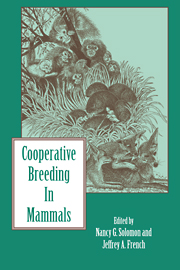Book contents
- Frontmatter
- Contents
- List of Contributors
- Preface
- 1 The Study of Mammalian Cooperative Breeding
- 2 The Bioenergetics of Parental Behavior and the Evolution of Alloparental Care in Marmosets and Tamarins
- 3 Proximate Regulation of Singular Breeding in Callitrichid Primates
- 4 Cooperative Breeding, Reproductive Suppression, and Body Mass in Canids
- 5 Hormonal and Experiential Factors in the Expression of Social and Parental Behavior in Canids
- 6 Variation in Reproductive Suppression among Dwarf Mongooses: Interplay between Mechanisms and Evolution
- 7 Dynamic Optimization and Cooperative Breeding: An Evaluation of Future Fitness Effects
- 8 Examination of Alternative Hypotheses for Cooperative Breeding in Rodents
- 9 The Psychobiological Basis of Cooperative Breeding in Rodents
- 10 Cooperative Breeding in Naked Mole-Rats: Implications for Vertebrate and Invertebrate Sociality
- 11 The Physiology of a Reproductive Dictatorship: Regulation of Male and Female Reproduction by a Single Breeding Female in Colonies of Naked Mole-Rats
- 12 Factors Influencing the Occurrence of Communal Care in Plural Breeding Mammals
- 13 A Bird's-Eye View of Mammalian Cooperative Breeding
- Index
12 - Factors Influencing the Occurrence of Communal Care in Plural Breeding Mammals
Published online by Cambridge University Press: 21 October 2009
- Frontmatter
- Contents
- List of Contributors
- Preface
- 1 The Study of Mammalian Cooperative Breeding
- 2 The Bioenergetics of Parental Behavior and the Evolution of Alloparental Care in Marmosets and Tamarins
- 3 Proximate Regulation of Singular Breeding in Callitrichid Primates
- 4 Cooperative Breeding, Reproductive Suppression, and Body Mass in Canids
- 5 Hormonal and Experiential Factors in the Expression of Social and Parental Behavior in Canids
- 6 Variation in Reproductive Suppression among Dwarf Mongooses: Interplay between Mechanisms and Evolution
- 7 Dynamic Optimization and Cooperative Breeding: An Evaluation of Future Fitness Effects
- 8 Examination of Alternative Hypotheses for Cooperative Breeding in Rodents
- 9 The Psychobiological Basis of Cooperative Breeding in Rodents
- 10 Cooperative Breeding in Naked Mole-Rats: Implications for Vertebrate and Invertebrate Sociality
- 11 The Physiology of a Reproductive Dictatorship: Regulation of Male and Female Reproduction by a Single Breeding Female in Colonies of Naked Mole-Rats
- 12 Factors Influencing the Occurrence of Communal Care in Plural Breeding Mammals
- 13 A Bird's-Eye View of Mammalian Cooperative Breeding
- Index
Summary
Introduction
Across group-living mammals, there is a continuum of reproductive skew from societies in which a single pair is responsible for all reproduction (singular breeders) to those in which all adults reproduce (plural breeders) (Keller & Reeve 1994). Factors influencing the degree of skew include extrinsic, ecological factors, such as saturation of available breeding sites, and intrinsic factors, such as the energetic costs of reproduction that limit the success of breeding attempts by subordinates (Vehrencamp 1983; Creel & Creel 1991; other chapters in this volume). Across this continuum, there is also variation in the degree to which members of the social group assist in the rearing of offspring of other members of the social group (i.e., communal care). Communal care that occurs at the singular-breeding end of the spectrum usually takes the form of nonbreeding helpers at the nest or den that defend and provision the offspring. Most chapters in this book focus on this kind of care. Communal care that occurs among plural-breeding species most frequently involves behaviors such as communal defense or provisioning of offspring, often by other breeding individuals within the group. In this chapter, we will examine the occurrence of communal care in plural-breeding mammals.
- Type
- Chapter
- Information
- Cooperative Breeding in Mammals , pp. 335 - 363Publisher: Cambridge University PressPrint publication year: 1997
- 3
- Cited by



